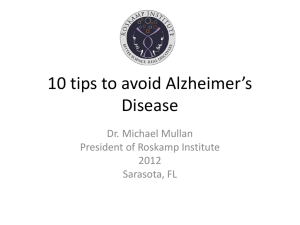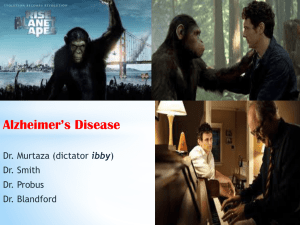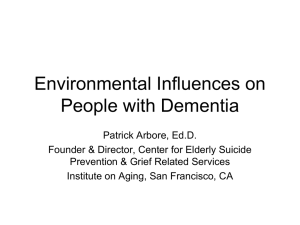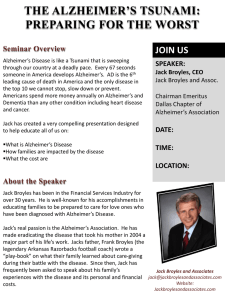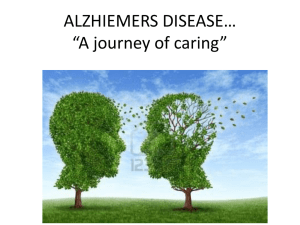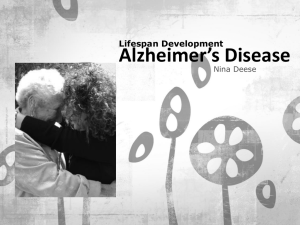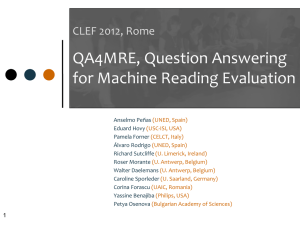8 Alzheimer`s Disease
advertisement
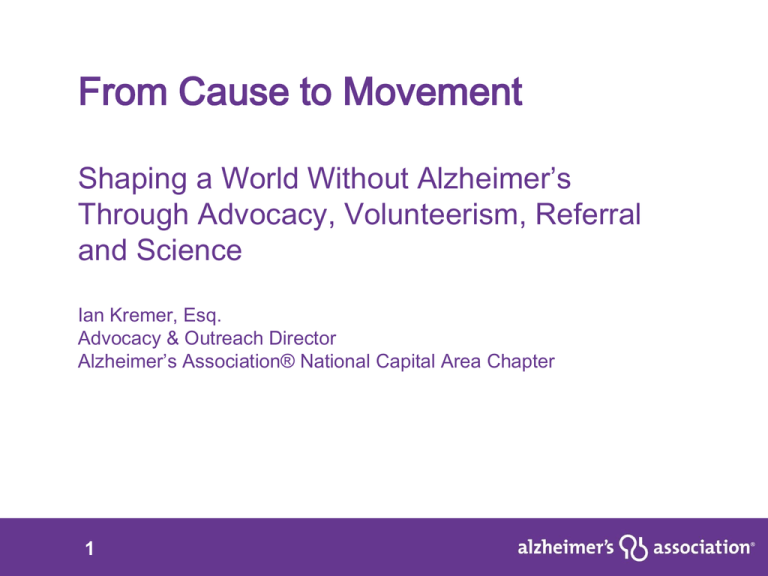
From Cause to Movement Shaping a World Without Alzheimer’s Through Advocacy, Volunteerism, Referral and Science Ian Kremer, Esq. Advocacy & Outreach Director Alzheimer’s Association® National Capital Area Chapter 1 Learning Objectives Our nation no longer has the option to accept Alzheimer’s and related disorders Health care professionals, consumers and the Alzheimer’s Association must collaborate to advance diagnosis, care and research Our actions will accelerate science and change the trajectory of the Alzheimer epidemic 2 From Cause to Movement Necessity & Opportunity National Priority Transformative Change 3 Alzheimer’s: the Silent Epidemic 5.4 million Americans have Alzheimer’s (including 200,000 with young onset) 14.9 million unpaid family caregivers Alzheimer’s is the only top-10 cause of death without a known way to prevent, slow or cure Unless we change the trajectory,13-16 million Americans will have Alzheimer’s by mid-century 4 Estimated Number of New Alzheimer’s Cases (In Thousands) New Cases in Thousands 1200 959 1000 820 800 615 600 400 377 411 1995 2000 491 454 200 0 2010 2020 Year 5 Source: Hebert et al. (2001). Alzheimer Disease Associated Disorders, 15(4), 169-173. 2030 2040 2050 Alzheimer’s Disease Impact on Baby Boomers One in six women and one in ten men age 55 and older can expect to develop Alzheimer’s disease. One in eight people over age 65 have Alzheimer’s One in two people over age 85 have Alzheimer’s 6 News You Can (and Must) Use Early Detection, Proper Diagnosis & Documentation Sharing the News with Patient/Family Referral to Community Resources Participation in Clinical Trials Collaboration with Alzheimer’s Association Advocacy 7 Alzheimer’s Disease: Course, Prevention, Treatment Strategies Intervention Clinical Clinical State State Primary Prevention Normal Brain No Disease Pathologic No Symptoms State Presymptomatic AD Early Brain Changes No Symptoms Secondary Prevention Mild Cognitive Impairment AD Brain Changes Mild Symptoms Disease Progression 8 Treatment AD Mild, Moderate, or Severe Impairment Treatment Outcomes in Alzheimer’s Disease Functional ability Cure Maintenance of function Slowing of disease progression Treatment Symptomatic benefit Natural Progression Time 9 10 Alzheimer’s Association TrialMatch™ Free, easy to use service Preview over 100 studies related to MCI, Alzheimer’s and related disorders Match specific profiles of patient diagnosis, clinical history and location with study criteria 11 Medical Community Collaboration Purple Envelope Project Physician Outreach Project Jane.Priest@alz.org or 703-766-9018 12 Advocacy Goals Alzheimer’s Breakthrough Act HOPE for Alzheimer’s Act (Health Outcomes, Planning & Education) National Alzheimer’s Project Act (implementation input napa.alz.org) 13 Our Vision: A World Without Alzheimer’s www.alz.org/nca 1.800.272.3900 14
